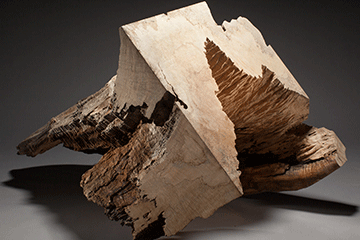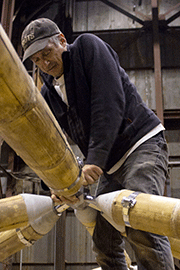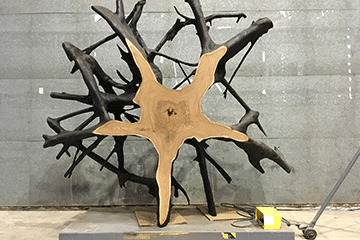
08/31/2021
Like the Lorax in the Dr. Seuss book of the same name, Jack Elliott speaks for the trees. But he also listens to them.
Elliott — an artist, architect, designer and educator based in Ithaca, N.Y. — unearths the hidden beauty of tree trunks, limbs and roots that have been naturally harvested or been removed because of disease or obstruction.
He calls this environmentally conscious art “Arborworks,” and his most recent series of pieces sculpted from tree remnants and other natural material will be on display in SUNY Cortland’s Dowd Gallery starting Monday, Aug. 30. The exhibition, titled “Laying in the Cut, will run through Saturday, Oct. 16.
The art that will be on display virtually and inside the gallery in the Dowd Fine Arts Center includes large-scale solitary objects, small sculptures combining traditional Chinese lacquer techniques and two-dimensional wall pieces.
“The sculptures often refer to an environmental issue, such as climate change or the depreciation of nature, but their primary purpose is to move the viewer through their form and surface, often charged with symbolic associations,” Elliott said.
Through his art, Elliot, an interdisciplinary artist, writer and associate professor at Cornell’s Design and Environmental Analysis Department in the College of Human Ecology, gives viewers an opportunity to shed their self-absorption with human matters: their Anthropocene point of view. This opens up his work to consideration from a range of other disciplines such as biology, eco-art, literature, folk art and other fields of study.

In connection with “Laying in the Cut,” the gallery will host an opening reception from 5 to 7:30 p.m. on Thursday, Sept. 2; as well as documentary film screenings, a workshop, virtual tours and in-person visits.
Elliott will give an in-person, guided tour of his exhibition from 6 to 7 p.m. every Thursday during the exhibition.
In addition, Elliott will summarize his practice as a sculptor and scholar that deals with “nature inside,” both in a theoretical and a practical sense, during an artist’s talk at 5 p.m. Thursday, Sept. 16, in the gallery.
The exhibition and related events are free and open to the public. Visitors from outside the SUNY Cortland campus community will be welcome inside the gallery. However, each visitor must fill out a Visitor Registration and Screening Form at least 12 hours in advance of the visit to prevent the spread of the COVID-19 virus. The form also can be filled out at the gallery. Visit the Dowd Gallery website and social media for detailed information about other programs and link invitations to a virtual event.
In general, Elliott produces sculptures that explore the relationship between trees, people and our shared biophysical environment.
“Conceptually, Elliott is interested in the aspects of the material culture of the built environment that express a society’s set of values as they pertain to the natural world, especially regarding environmental ethics and aesthetics,” explained gallery director Jaroslava Prihodova.
Elliott’s broad practice brushes against topics associated with human ecology, nature and the Anthropocene, a proposed geological epoch dating from the commencement of significant human impact on Earth’s geology and ecosystems including, but not limited to, anthropogenic climate change. The work exposes the hidden beauty of these specimens through strategic planar cuts and as intentional in orientations and placements. Each object is different, but they are all characterized by the aim to challenge ideas about the human/nature relationship through juxtapositions of the geometric and the organic; the intentional and the spontaneous; the light and the dark.
“I do not force the material away from what it is as a sign of mastery,” Elliott said. “I work with the material as it is to allow its hidden powers to be revealed through a set of minimalist interventions.”

His sculpture seeks to express the sense and love of life and nature that people share, regardless of their backgrounds, and shift away from humanity’s self-absorption.
“The sculpture intends to de-center the anthropocentric for the biocentric, where the boundaries between humans and trees are deliberately blurred in a kind of ecological post-humanist approach to art,” Elliott said.
The exhibition is supported by the university's Art and Art History Department, Art Exhibition Association, and Campus Artist and Lecture Series.
For more information, to inquire about an appointment, a tour, or additional images, contact Prihodova at 607-753-4216. Visit the Dowd Gallery website for details about exhibiting artists, other programs, safety protocols and online booking.
Additional events relating to “Laying in the Cut” are as follows:
- First Friday: A guided tour, both in person and virtual, will be offered from 5:30 to 8 p.m. on Friday, Sept. 3, and from 5:30 to 8 p.m. on Friday, Oct. 1. Organized by the Cultural Council of Cortland County and co-hosted with the gallery, the event will be shared on the Dowd Gallery website as well as Facebook and Instagram.
- Documentary Screening: “The Hidden Life of Trees,” a 2020 film directed by Julia Dordel and Guido Tolke, will be shown at 5 p.m. on Wednesday, Sept. 8, in the gallery.
- Documentary Screening: “In Grain,” a compilation of short films, will be screened at 5 p.m. on Wednesday, Sept. 22, in Dowd Gallery.
- Virtual Panel Discussion: Three scholars — on plant science, literature and ecological art — will discuss “Natural Emergence” at 5 p.m. Wednesday, Oct. 6, via Webex. Panelists will include Johannes Lehmann, a professor at the School of Integrative Plant Science Soil and Crop Sciences Section in the College of Agriculture and Life Sciences at Cornell University; Timothy Murray, professor of comparative literature and English in Cornell’s College of Arts and Sciences, director of the Cornell Council for the Arts, and curator at Cornell University; and Patricia Watts, writer, curator and founder of the EcoArtSpace art collective in New Mexico.
- Artist’s Workshop: Elliott will demonstrate his sculpting techniques in a workshop titled “Tesselles” on Tuesday, Oct. 12. The event time and location are to be announced.
- Gallery Talk: Steven Broyles, a SUNY Distinguished Teaching Professor in the university’s Biological Sciences Department, will discuss “A Walk Through Wood” at 5 p.m. Thursday, Oct. 14 in Dowd Gallery. His talk will focus on the importance of tree diversity in our ecosystem and the impart and the long-lasting implication that the loss of diversity has on the urban environment.